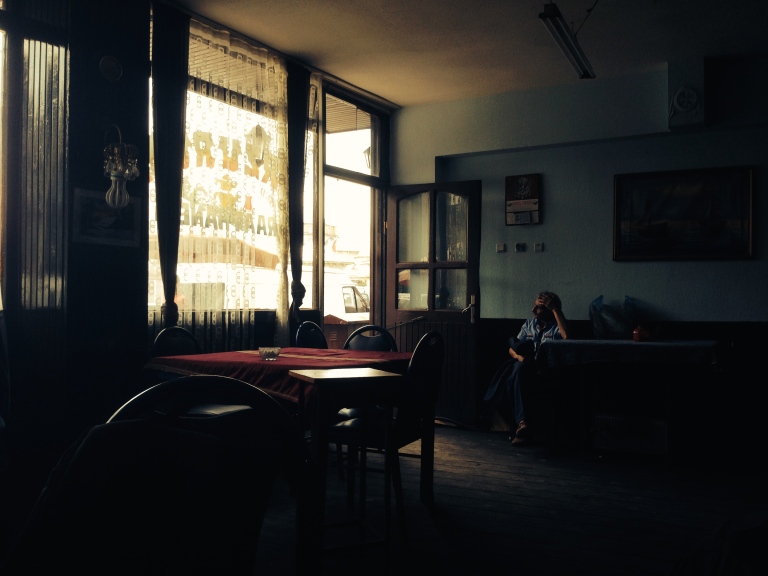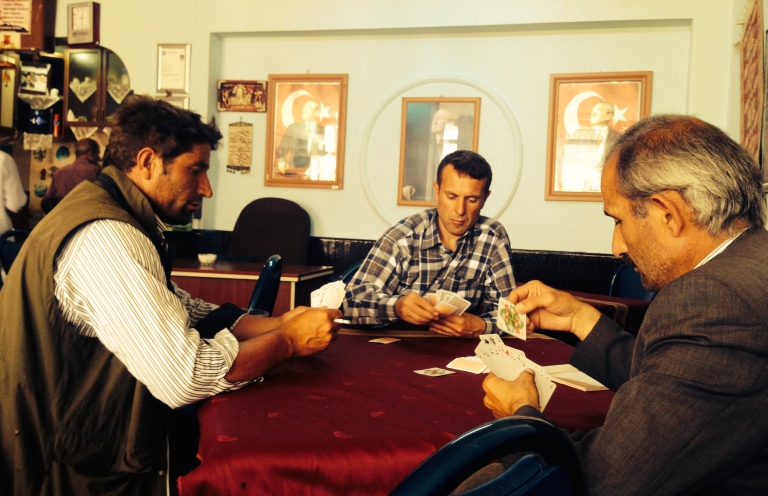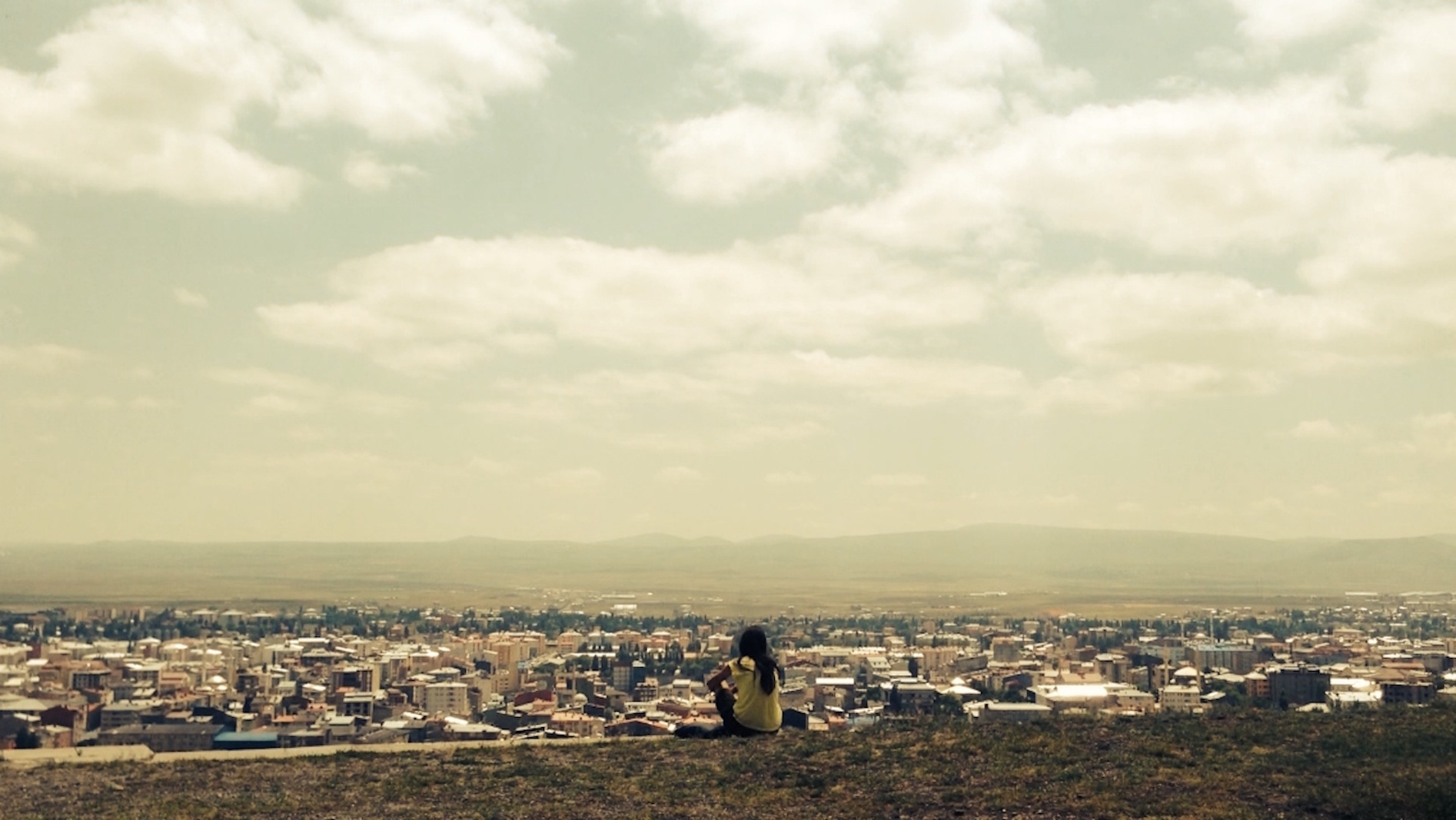Not five minutes after entering Kars it begins to pour with rain. Hard, violent rain that empties streets. The weeks of heat and sweat that led us here disappear from memory.
Nobody really visits Kars. A dilapidated and unkempt city perched on the far eastern extremities of Turkey, it is poor and unloved; famous more for the incessancy of its winter snow than the faded grandeur of its Tsarist-era architecture. What remains of its cobbled streets are in disarray, patched together here and there with Tarmac and assorted masonry, while concrete eyesores, the likes of which scar cities the length and breadth of Anatolia, line parallel avenues and their shabby, intersecting streets.
Writer Orhan Pamuk’s Kars was a desolate, unforgiving city filled with religious and political tension. In his hands the city was a character, not a place. Endless cold winters blighted this border town between two defunct empires – the Ottoman and the Russian – and though once prosperous and diverse, it was now reduced to obscurity and decay. When Pamuk’s protagonist Ka re-enters the city after 20 years in the novel Snow, “he saw a hint of the old days in the horse-drawn carriages here and there, waiting in garages, but the city itself looked much poorer and sadder than he remembered. Through the frozen windows of the bus, Ka saw the same concrete apartments that had sprung up all over Turkey during the past ten years, and the same Plexiglas panels; he also saw banners emblazoned with campaign slogans strung above every street”.
Kars is the end of the line; all but the final stop on the Trans-Anatolian railway that snakes across Turkey from Istanbul to Doğukapi and the closed border with Armenia. Most Turks have never been here, let alone foreigners, and those that do visit do so primarily to see the ruins of the ancient Armenian capital of Ani, long since abandoned and lying 45km to the east of Kars. It is because of Pamuk, however, that I am here, having crossed the border with Georgia at Türkgözü a few hours earlier.
Pamuk’s Snow is a masterpiece: a dissection of the Turkish soul and an exploration of the fault lines running through Turkish society. Perhaps most of all, it is an evocation of place. Ka walks through a city haunted by its past, both as a journalist investigating a spate of teenage suicides, and as a man and a poet seeking love. Kars is a city whose remnants of grace and beauty mix with the horrors of “endless wars, rebellions, massacres, and atrocity”. There is talk of mansions, of thousand-year-old churches, and of festivities that lasted for days. But most importantly there is the city that Ka encounters in all its snow-filled gloom and drudgery.
By the time the rain has abated the streets have been emptied and the drab, concrete apartments that Ka encountered surround me. Pockets of men dressed in earthy colours and tattered hats huddle together under canopies, waiting patiently for the last drop of rain to fall and for the day to continue. Ka once walked past “teahouses where gloomy unemployed men sat watching television and the falling snow”. Now those men watch us and my sense of remoteness is almost complete.
The tentacles of infrastructure that spread out from the border crossing of Türkgözü did so at a tentative pace, meandering through a vast and often desolate mountain landscape. It is only after three hours of solid driving that you realise just how remote Kars is. There is nothing here. Just the occasional pinprick of humanity amidst the beauty and enormity of eastern Anatolia. From the city’s citadel, sat atop a rocky hill overlooking the rooftops below, you realise this is not really a city at all, rather a large town surrounded by mile after mile of undulating pasture and rolling tablelands.

By the following morning spring has taken the edge off the worst of the night before and there’s a soft, refreshing breeze. Ahead of me the wind plays with the hair of a young woman weaving in and out of a crowd of pedestrians, her porcelain white face framed by long black hair that cascades past her shoulders in waves. To her left, minivans, pick-up trucks, lorries and cars clog streets and alleys set back from the main thoroughfare. Every nook and cranny is a maze of shops and business, all of varying degrees of unsightliness, while the incessant noise associated with trade rumbles on, punctuated only by the city’s deafening calls to prayer.
Kars is a difficult place to love. Difficult, that is, until you look beyond the weariness. There is no pretence here, only the actualities of life. Shops selling nothing but cheese and honey rub shoulders with confectioners filled floor-to-ceiling with sweets and nuts. Giant round blocks of cheese stacked high behind slices of raw honeycomb are embossed with names such as Şivahanlı Süt and FU Kars, while Turkish delight and baklava are weighed on antique scales and handed to customers in small but pristine brown paper bags. Here and there old, highly decorated tins remind you of the past.
It is a world away from the mass tourism of western and central Turkey, the Aegean and the Mediterranean coast, where authenticity has been lost and the Turkey of Pamuk’s childhood has all but disappeared. “Though he’d been living abroad for some time, Ka was still aware of it as the poorest, most overlooked corner of Turkey,” wrote Pamuk. “For this reason, he may have been taken by a desire to look farther afield for childhood and purity: If the world he knew in Istanbul was no longer to be found, his journey to Kars can be seen as an attempt to step outside the boundaries of his middle-class childhood, to venture at long last into the other world beyond. In fact, when he found the shop windows in Kars displaying things that he remembered from his childhood, things you never saw in Istanbul anymore – Gislaved gym shoes, Vesuv stoves, and (the first thing any child learned about Kars) those round boxes of the city’s famous processed cheese divided into six wedges, he felt happy enough even to forget the suicide girls: Kars brought him that peace of mind he once knew.”
By the time we reach the base of the hill leading up to the citadel, clouds have been drawn neatly across the sky. There are no signs that it will rain later, just intermittent spells of sunshine and a winding, cobbled pathway towards the top. Built in 1153, the citadel’s past acts as a reminder of Kars’ troubled history. Destroyed by the armies of Tamerlane in 1386 and rebuilt in 1579, the fortification was destroyed again 27 years later by the Persians. It was restored twice but badly damaged during the Russo-Turkish War of 1877-1878, with the city eventually falling to the Russians and remaining occupied for almost 40 years. After the First World War, Kars became a short-lived independent state, before the Turkish army entered under the command of Kâzım Karabekir, the general whose statue now stands in Station Square.
The history of the citadel, however, is far more interesting than its structure, much of which remains inaccessible to visitors. We head back, preferring instead to search for the places that Ka encountered in Snow: the Green Pastures Cafe, the New Life Pastry Shop, the Snow Palace Hotel and the National Theatre, all of which appear to be imaginary but are nevertheless based on the realities of life in Kars. We make it to Faikbey Avenue, where the offices of the Border City Gazette (circulation 320) were situated, and to the old governor’s mansion by the river, one of many grand architectural remnants of the Russian occupation, now painted lemon yellow and in need of attention.
“The Kars police headquarters,” wrote Pamuk “was in a long three-storey building on Faikbey Avenue, where the old stone buildings that had once belonged to wealthy Russians and Armenians now housed mostly government offices.” Similar buildings lie scattered throughout the city in varying degrees of disrepair. The occasional cafe or restaurant built in the Baltic style can be seen sandwiched between modern follies, their corners crumbling and their paint peeling.
Women, to a noticeable degree, are conspicuous by their absence. They are sprinkled here and there – on the streets, in banks, opposite lovers in restaurants – but they are outnumbered by men in all public places. None more so than in the city’s teahouses.

It is within teahouses that much of the city’s heart and soul resides. Men with faces carved from the earth, their hands chiselled from rock, puff on cigarettes beneath ‘no smoking’ signs, the walls behind them adorned with photographs of Atatürk; the father of modern, secular Turkey. Frayed flat caps, grey suits, playing cards, red velvet tablecloths and dusty wooden floors lend themselves to an atmosphere of humble simplicity. Wood is everywhere. Wooden chairs, wooden panelling, wooden tables with cigarette burns and the circular imprints of hot thin-waisted tea glasses. To our left and right, groups of men play cards as a shoeshine boy seeks our business. Behind him, an old man, his cap pushed towards the back of his head, enters the room and places two bags of bread and tomatoes on the floor beside him. It is our first tea of the day.
Pamuk’s favourite was the Birlik Kiraathanesi (the Unity Teahouse), which he mentions in Other Colors, a book of essays published in 2008. It is almost empty when we arrive by accident later on that afternoon. Only a single table is occupied and an old portable TV sits precariously upon a rickety shelving unit to the left of another framed photograph of Atatürk. In the centre of the high-ceilinged teahouse sits a heater, the likes of which I’ve never seen before. From its top emerges metallic stove-piping that rises a few feet before travelling half the length of the room and disappearing into the opposite wall. A game of cards has begun at the occupied table, voices are being raised, and the room is heavy with smoke.
“The teahouse was packed with unemployed men and students, and all around him the walls were plastered not just with scenes of Switzerland but also with theatrical posters, newspaper cartoons, assorted clippings, an announcement of the terms and conditions of the civil service exam, and a schedule of the soccer matches to be played by Karsspor that year,” wrote Pamuk in Snow. “The results of past matches – most of them losses – were penciled in by various hands; next to the 6–1 loss to Erzurumspor, someone had written the lines that Ka would incorporate into ‘All Humanity and the Stars’, the poem he would write tomorrow while sitting in the Lucky Brothers Teahouse: ‘Even if your mother came down from heaven to take you into her arms, Even if your wicked father let her go without a beating for just one night, You’d still be penniless, your shit would still freeze, your soul would still wither, there is no hope! If you’re unlucky enough to live in Kars, you might as well flush yourself down the toilet’.”
Kars doesn’t really have summers, just a short spring in July and August, and by the time we begin to head back to our hotel the air is sharp. In Other Colors, Pamuk wrote that he knew the novel Snow was “made of the stuff of the city, of its streets, inhabitants, trees, and shops and even from some of its faces”, but he also knew that “it does not resemble the real city”. By that he meant the melancholy, the heightened political and religious tension, and the sense of oppressive drudgery that led to the perception of a humbler existence. Either way, in 2008 he was unsure if he’d ever return. “A deep melancholy overtakes me each time I’ve known I am soon to leave Kars. The simplicity of life, the gentle companionship, the intimacy, the fragility of life, its continuity, and the sense of being in a place where time moves so slowly: These are the things that bind me to Kars.”
Early the next morning we too leave. As we ride the 17-hour train journey to Kayseri, Kars’ isolation becomes stark. Soon it is dark and the countryside outside has disappeared. All is black. Every now and then a light from a dwelling comes into view before been swept away at speed. It is unlikely that we will ever return.
* Published in Emirates Man, September 2014
